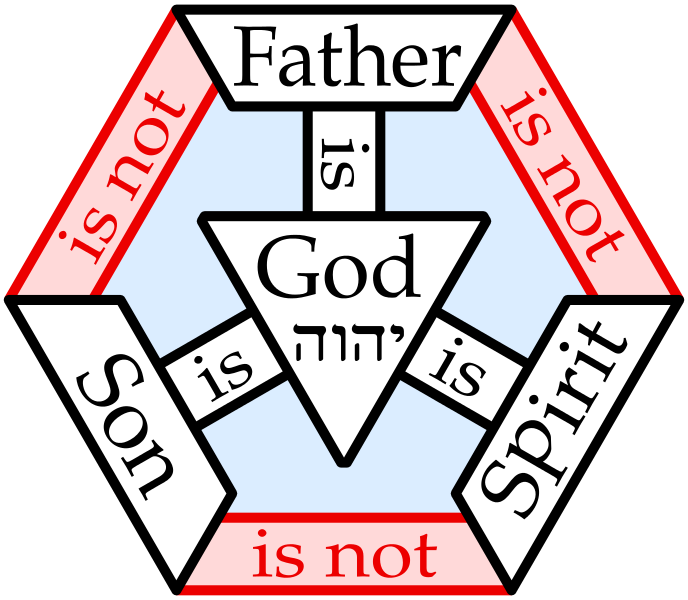Dear Brothers and Sisters,

In the Western liturgical calendar, the Sunday after Pentecost is Trinity Sunday—a day to rejoice in what theologians call “the divine mystery.” Though much about God is beyond our comprehension, by grace we are able to understand that God is one in Being and three in Person—the Trinity.
The nature of understanding
Thinking about understanding, we acknowledge that, at times, it comes suddenly—like a flash of light seemingly out of nowhere. But most often, it comes gradually—the way I came to understand mathematics when I was young. As I began to grasp the concepts of algebra, many of my classmates remained perplexed. The further we progressed in math, the smaller the classes became—many of my classmates did not want to torture their brains that way! But for those who stuck it out, the reward was a broader and deeper understanding of the marvelous world of mathematics, which tells us so much about the intricacies of God’s amazing creation.
Why it’s vital to study theology
I share this math illustration because I see a similarity in the way we grow in our understanding of God’s Triune nature. For various reasons, some Christians are unwilling to study theology, which includes challenging concepts like God’s three hypostases (Persons). Though not “lesser Christians,” these folks (who believe in and love God), remain uninformed concerning the history of how the church came to understand the doctrine of the Trinity. While this understanding is important for all Christians, it’s vital for those who teach within the church. If preachers and teachers don’t have an accurate understanding of the nature of God, what they teach may be a fuzzy (even distorted) picture of God. Lacking understanding of theology, they will be unable to answer the questions members have about God and unable to counter the false teachings about God that undermine the faith of many of God’s children.

(public domain via Wikimedia Commons)
Brothers and sisters, because this is a serious matter, I strongly encourage our pastors, preachers and teachers to carefully study theology, abandoning all false notions concerning church history and misinterpretations of Scripture, in order to embrace the historic, orthodox teaching of the church concerning the doctrine of the Trinity, which can be summarized in three fundamental truths:
- There is one God (Mark 12:29; John 14:9; Heb. 1:2-3).
- God is three distinct (not separate) Persons (Matt. 3:13-17; Matt. 28:19; John 1:1; Col. 1:15-16; John 14:17).
- Each Person is fully God (Phil. 2; Col. 2:9; Acts 5:3-4).
Avoid flawed analogies
Over the centuries, several analogies have been used to help people understand the Trinity. Unfortunately, in one way or another, most of them advance false ideas. Here are four examples: [1]
- The Trinity is like the three forms of water: ice, liquid and vapor. While it is true that water exists in these three forms, looking at God this way advances the false idea (a heresy called Modalism) that God merely represents himself in three different forms, but is not three distinct Persons. Historically, the primary proponents of Modalism taught that God first manifested himself as Father, then as Jesus, then as the Holy Spirit. These modes were viewed as consecutive, temporary and thus never co-existent, thus denying the distinctiveness of the three eternal Persons of the Trinity.
- The Trinity is like the three parts of an egg: shell, white and yolk. By viewing God as existing in parts, this analogy teaches a heresy called Tritheism. But the three Persons of the Trinity are not three unalike parts (as with the parts of an egg). God is revealed to be three divine Persons who share one divine nature and are one in Being.
- The Trinity is like a three-leaf clover: one entity with three parts. This is perhaps the most well-known analogy, purported to have been used by St Patrick. Like the analogy of the three parts of an egg, this analogy fails to account for the fact that the Godhead is not simply split into thirds.
- The Trinity is like a man who is a father, a son and a husband: one man, three functions. The problem here is that the Father, Son and Holy Spirit are not merely functions of God—they are three distinct Persons. A typical man may have a wife (and so be a husband), children (and so be a father), but he acts out these differing roles depending on whom he is interacting with at the time. This analogy is another form of Modalism.
The careful use of human language
When it comes to teaching the truth concerning God’s nature, human language (which is always analogical) falls short in one way or another because it is unable to fully embody all that God is. For example, we use the word “Persons” to refer to the three “distinctions” of God. Doing so is helpful because out of all created reality, the Father, Son and Holy Spirit are most like human persons in nature (or we might say that human persons are in their nature most like the Father, Son and Holy Spirit). We capitalize Persons to indicate that the word is being used in a special manner in describing God’s nature. Thus we exercise great care in selecting words knowing that, as the apostle Paul wrote, “The mystery of godliness is great,” humbly acknowledging that God is much greater than we can say or understand. Not being a creature, God cannot be understood in the same way we understand created things. However, because God has revealed himself to us, we can apprehend God even though we cannot exhaustively comprehend God.
A common shorthand version of the doctrine of the Trinity says that “God is three in one.” Some anti-Trinitarians say this is a contradiction, but they are wrong—it’s a paradox. Knowing of paradoxes in the physical realm (e.g., light is both a wave and a particle) it should not surprise us to learn that, when it comes to God’s nature, there are paradoxes. To say that “God is three in one” is not to say that God is one in Being and three in Being, or that God is one in Person and three in Person (those statements are contradictions). Instead it is saying that, paradoxically, God is one in Being and three in Person.
It is not the intent of the doctrine of the Trinity to explain how God is triune. That, as Paul reminds us, is a “mystery.” The teachers of the early church taught that proper doctrine preserves this mystery, for God cannot be exhaustively explained as though God were a creature. In humility we confess that our understanding of God’s nature has limitations, though Jesus did reveal to us the personal names of the three Persons of the one God: the Father, the Son, and the Holy Spirit.
We also learn from Jesus that rather than a lonely being, God is a fellowship (communion) of Father, Son and Holy Spirit who have their very being by being in a relationship of holy love—knowing and glorifying one another for all eternity. That is why John tells us that God, who is love (1 John 4:16), out of love sent his only Son to reconcile the world to himself (John 3:16). Thus it makes perfect sense that the central will of our Triune God for us is that we would love God with all our heart, soul, mind and strength, and love our neighbors as we are loved by God (Matthew 22:37-39).
With these thoughts about God in mind, GCI’s Statement of Beliefs says this:
God, by the testimony of Scripture, is one divine Being in three eternal, co-essential, yet distinct Persons—Father, Son, and Holy Spirit. The One God may be known only in the Three and the Three may be known only as the one true God, good, omnipotent, omniscient and omnipresent, and immutable in his covenant love for humanity. He is Creator of heaven and earth, Sustainer of the universe, and Author of human salvation. Though transcendent, God freely and in divine love, grace and goodness involves himself with humanity directly and personally in Jesus Christ, that humanity, by the Spirit, might share in his eternal life as his children. (Mark 12:29; Matthew 28:19; John 14:9; 1 John 4:8; Romans 5:8; Titus 2:11; Hebrews 1:2-3; 1 Peter 1:2; Galatians 3:26)
Why seek to grow in understanding God?
I’ll end now with one of my favorite quotes from Charles Haddon Spurgeon—it says well why we seek a deeper understanding of God.
It has been said by someone that “the proper study of mankind is man.” I will not oppose the idea, but I believe it is equally true that the proper study of God’s elect is God; the proper study of a Christian is the Godhead. The highest science, the loftiest speculation, the mightiest philosophy, which can ever engage the attention of a child of God, is the name, the nature, the person, the work, the doings, and the existence of the great God whom he calls his Father. There is something exceedingly improving to the mind in a contemplation of the Divinity. It is a subject so vast, that all our thoughts are lost in its immensity; so deep, that our pride is drowned in its infinity. Other subjects we can compass and grapple with; in them we feel a kind of self-content, and go our way with the thought, “Behold I am wise.” But when we come to this master-science, finding that our plumb-line cannot sound its depth, and that our eagle eye cannot see its height, we turn away with the thought, that vain man would be wise, but he is like a wild ass’s colt; and with the solemn exclamation, “I am but of yesterday, and know nothing.” No subject of contemplation will tend more to humble the mind, than thoughts of God.
Forever seeking a deeper understanding of our Triune God,
Joseph Tkach
[1] For a short, amusing (tongue-in-cheek) and insightful video addressing some of the common analogies related to the Triune nature of God, watch the video at https://youtu.be/KQLfgaUoQCw. For a Trinity Sunday sermon by Weekly Update Managing Editor Ted Johnston, click here.

